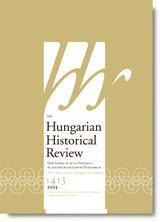Jews in a ‘Judenrein’ City: Hungarian Jewish Slave Laborers in Vienna (1944–1945)
Jews in a ‘Judenrein’ City: Hungarian Jewish Slave Laborers in Vienna (1944–1945)
Author(s): Kinga Frojimovics, Éva KovácsSubject(s): History of the Holocaust
Published by: Magyar Tudományos Akadémia Bölcsészettudományi Kutatóközpont Történettudományi Intézet
Keywords: Holocaust; Nazi persecution; Hungarian Jews; Austria; forced labor; oral history; urban spaces; World War II
Summary/Abstract: In the early summer and autumn of 1944, more than 55,000 Hungarian Jews had been deported to Austria as forced laborers. 17,500 of them arrived in Strasshof from various Hungarian ghettos in the summer of 1944. There, a real “slave market” was opened to meet the demands of Austrian entrepreneurs who urgently needed manpower in their factories and farms. The deported families—mainly mothers, children and grandparents—had to work in Vienna and in Lower Austria on farms, in trade, and in particular in the “war industry” (for example, in construction companies, bread factories, or oil refineries) as forced laborers. The working and living conditions of the forced laborers varied widely depending on the camp in which they were housed, the branch of industry in which they had to work, and the conduct of the local military administration in the camps and the various workplaces. In this essay, we highlight two fundamental aspects of the topic which are connected to two different methodological approaches to socio-historical understanding. On the one hand, we re-localize the history of Hungarian Jewish slave labor in Vienna on the basis of historical sources, documents and testimonies. On the other, using the same testimonies and archival materials, we portray the everyday lives and typical survival strategies of slave laborers.
Journal: The Hungarian historical review : new series of Acta Historica Academiae Scientiarum Hungaricae
- Issue Year: 4/2015
- Issue No: 3
- Page Range: 705-736
- Page Count: 32
- Language: English

